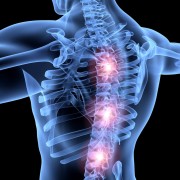Endoscopic spinal surgery to treat back pain
Minimally invasive approach heals spine diseases, such as chronic back pain, with reduced muscle injury

Chronic back pain is a common health problem, and one that is increasing in prevalence as the global population ages. While most back pain can be treated by conservative measures, when therapeutic treatment fails to cure those patients with a herniated disc or spinal stenosis, Endoscopic Spinal Surgery – a minimally invasive surgical approach that uses an endoscope to operate with increased precision – may be in order.
Dr Verapan Kuansongtham, a neurosurgeon and Director of Bumrungrad Spine Institute, is one of the pioneers in endoscopic spinal surgery in Asia and has been instrumental in bringing this technology to the region, after it was first developed in Germany in 2000.
What causes back pain?
Back and neck pain is very common in adults. Most cases aren’t that serious and are often caused by bad posture habits or heavy physical activity that strains muscles and causes temporary pain.
Most patients can overcome back or neck pain with a mixture of improved posture, more rest, and anti-inflammatory medication. When pain persists however, or spreads to other areas of the body, such as the arms or legs, it can be a sign of a more serious nervous system condition.
That makes a thorough, detailed medical history vital to proper diagnosis. Doctors also have a range of tests such as X-ray imaging, MRI scans and nerve tests to help identify the source of the problem, so that the proper treatment strategy can be implemented.
How Endoscopic Spinal Surgery treats spinal diseases
Back pain that persists for at least three months is classified as chronic. Chronic pain coupled with pain and weakness in the legs that does not respond to therapeutic treatment, is often an indicator for spinal surgery. Endoscopic spine surgery is one approach that can be used to treat chronic back pain caused by herniated spinal discs or lumbar spinal stenosis.
While other minimally invasive spinal surgeries see surgeons cut through healthy tissue in order to reach the bone or disc of concern, using a microscope to enlarge the surgical field from outside the human body, an endoscopic approach uses an endoscope – a thin tube mounted with a camera – to see the compressed spinal nerves from inside. It allows the surgeon to reach the surgical point where the nerves are compressed, whether that compression is caused by a bulging disc or degenerated joints and tendons, without muscle resection from the bone.
Endoscopic surgical techniques and tools were originally invented by a German doctor. The procedure involves a smaller incision that requires surgical skill as much as advanced equipment. With a smaller incision site, patients experience less pain, a lower risk of infection, less damage to surrounding tissues in the spine, and ultimately a quicker recovery.
There are however some limitations for Endoscopic Spinal Surgery, especially in situations where a patient might have a multi-level severe stenosis or listhesis, where there is forward displacement of a vertebra over a lower segment. In these cases patients will need other minimally invasive spinal surgeries that use a microscope and require a larger approach to treat the condition.
Bumrungrad Spine Institute
Bumrungrad Spine Institute provides advanced, comprehensive treatment for patients with back and neck problems.
Home to a team of internationally-trained orthopaedic surgeons and neurosurgeons, the institute offers advanced technologies in spinal surgery and rehabilitation to provide treatment for patients. Over 1,300 procedures are performed per year, with half of them major surgery under general anaesthesia.
The Asian Endospine Training Center was established at Bumrungrad Hospital in 2011 with the cooperation of Richard Wolf GmbH and St. Anna Hospital-Herne in Germany. The center receives around forty spine surgeons per year from around the world from countries such as Japan, USA, Brazil, Taiwan, Hong Kong, India, China, Malaysia, Philippines, and Vietnam. Bumrungrad Spine Institute’s surgical team has worked closely with German doctors and engineers to improve endoscopic techniques and procedures and to develop more advanced tools for Endoscopic Spinal Surgery in Asia.
In addition to Endoscopic Spinal Surgery, Bumrungrad Spine Institute offers other advanced minimally invasive surgery techniques, such as percutaneous (keyhole) fusion with computerized navigation system (TLIF, OLIF, ALIF), which promotes quick recovery with less pain.
For more information, visit Bumrungrad's Spine Institute.
Bumrungrad International Hospital – Spine Institute
20th floor, 33 Sukhumvit 3 (Soi Nana Nua)
Wattana, Bangkok, 10110 Thailand
Tel: +66 (0) 2667 9538
www.bumrungrad.com
Related Articles
What causes back pain?
Dr Benjamin Tow discusses the most common causes of acute and chronic back pain
Read moreSpinal surgeries without cutting open the patient
Minimally invasive procedures can result in more comfort and less downtime
Read morePooja Physiotherapy Health Care Center.
A one-stop center for all your Physiotherapy needs with expertise in a diverse range of conditions.
Read moreLatest Articles
Medical Care
Can a Stroke Lead to Dementia? What You Need to Know
Can Stroke Cause Dementia? Learn about the relationship between these two in our insightful article. Discover prevention and management strategies.
Read moreMedical Care
Clearing the Fog: Dispelling Common Diabetes Myths in Singapore
Uncover the truths and myths about diabetes with insights from Harmony Thyroid, Endocrinology and Diabetes Centre. Learn about prevention, diagnosis, and management strategies for diabetes in Singapore. Get expert guidance from Senior Consultant Endocrinologist Dr. Vikram Sonawane to navigate your diabetes journey effectively.
Read moreMedical Care
Achieving Swift Recovery: Enhanced Recovery (ERAS) Direct Anterior Approach Total Hip Replacement
Consider total hip replacement with Alps Orthopaedic Centre's ERAS Direct Anterior Approach for faster recovery and reduced hospital stays. Learn about Dr. Jerry Chen's expertise in Singapore.
Read more